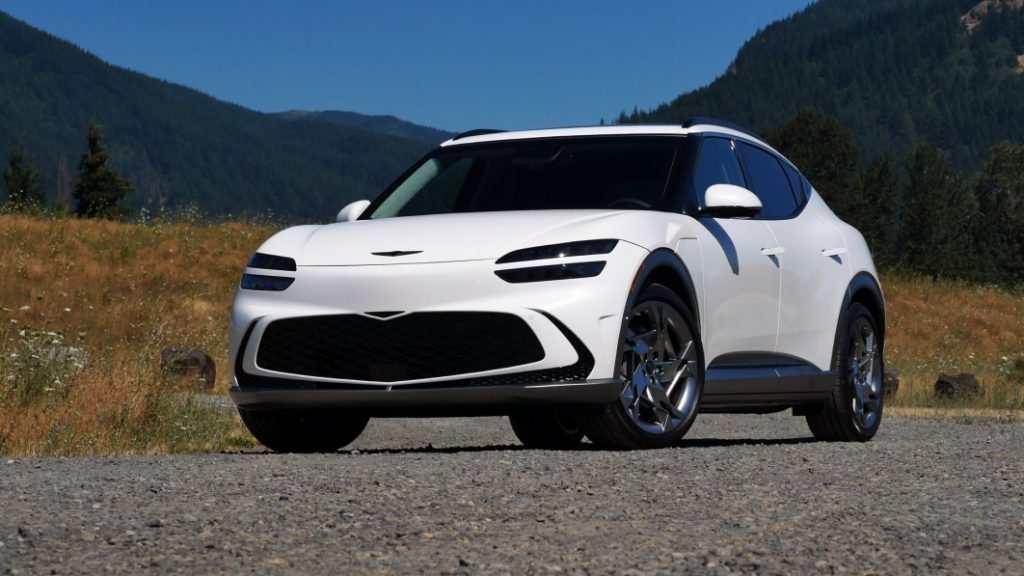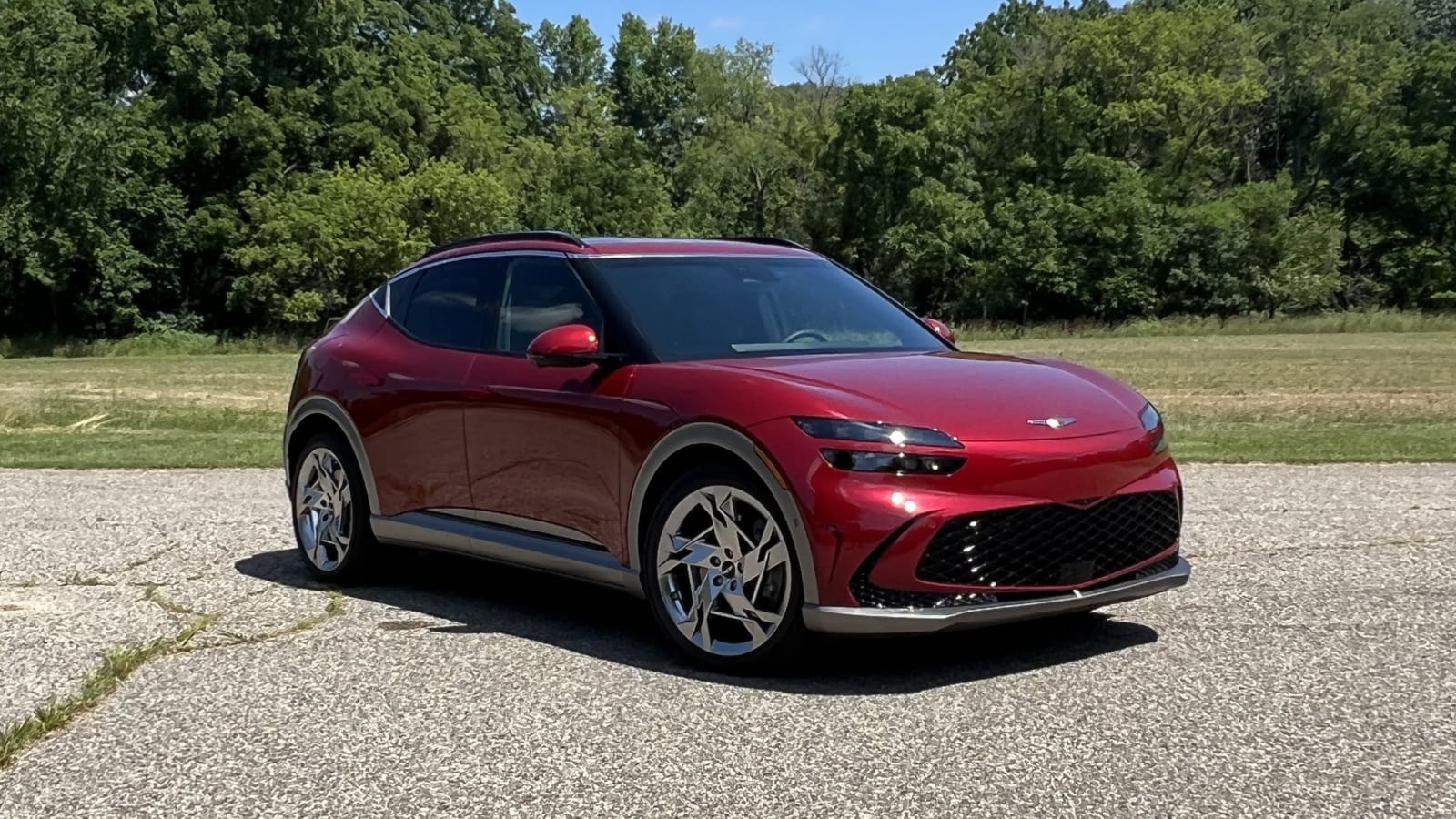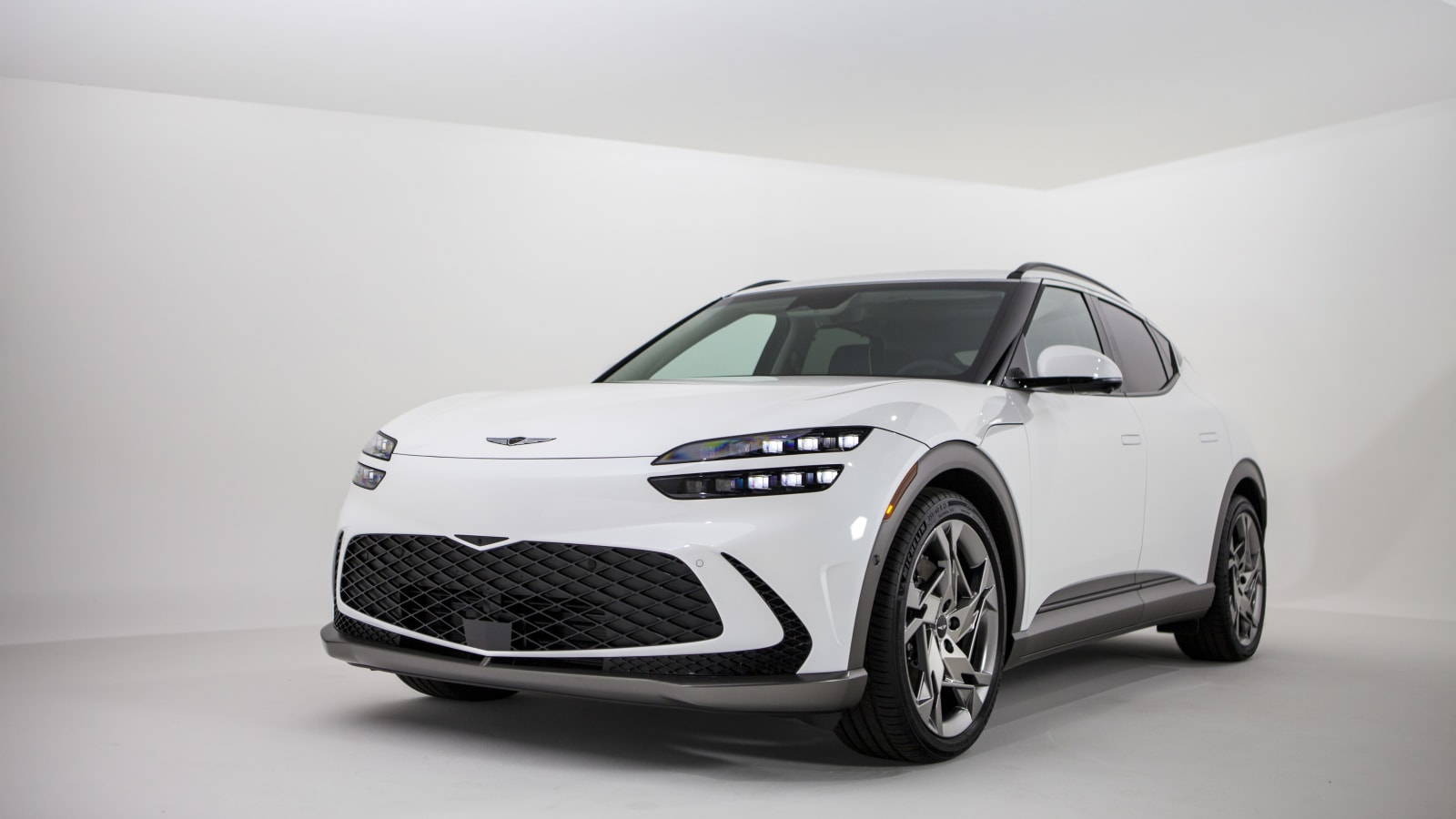2023 Genesis GV60 Review: Doesn't raise the bar high enough

Pros: Exceptional tech; distinctive interior design; ample standard features; comfy ride; hatchback versatility; bold colors
Cons: A $60,000 hatchback won’t be for everyone; poor value relative to Hyundai and Kia siblings; iffy range
The 2023 Genesis GV60 is the third, luxury-oriented take on the same excellent electric car platform found in the Kia EV6 and Hyundai Ioniq 5 (the Ioniq 6 will be the fourth). Given its luxury badge and market position, the GV60 raises the bar from its siblings in terms of performance, features content and interior quality. Frankly, none of the above are exactly issues for its siblings, which is perhaps the GV60’s greatest issue. Although impressive in a vacuum, we’re not sure it raises the bar far enough, especially when its lofty price point puts it in line with a BMW i4 and other luxury-branded EVs.
That’s not to say that Genesis can’t stand toe-to-toe with older luxury marques in terms of delivering actual luxury. Far from it. Its interior ambience, quality and technology can be superior. Infotainment and safety tech in particular are incredibly well executed, and are joined by novel features like facial recognition entry and fingerprint starting. Indeed, you don’t need a key to get underway in a GV60. Just look at the B pillar from the outside and the door will unlock; once in the driver seat, put your finger on a spot on the center console and watch as the strange glowing orb on the center console rotates 180 degrees to reveal a rotary shift knob. It’s fancy, futuristic stuff that’ll make your friends go “oooooh.”
Instead, we wonder if the typical American luxury shopper (and their friends) is going to be wowed by what is effectively a midsize hatchback that starts at $60,000 and tops out at $70,000. Genesis may market the GV60 as a “crossover,” but in person, it totally looks like a hatchback. That might be a tough sell compared to an i4 or a Tesla, and worse, it doesn’t go as far on a charge as those.
Interior & Technology | Passenger & Cargo Space | Performance & Range
What it’s like to drive | Pricing & Trim Levels | Crash Ratings & Safety Features
What’s new for 2023?
The GV60 is an all-new model this year.
What are the GV60 interior and in-car technology like?
If the exterior is a bit weird and not exactly what one expects from a $60,000 luxury car, the interior is absolutely what one should expect from a $60,000 luxury car. Materials quality is excellent, from the fanciful switchgear (people just love the rotating shift orb) to the leather covering most surfaces up front. We especially like the unique Torrent Navy leather interior with Sao Paulo Lime accents you see above. You’re definitely not getting that in a Tesla. Very cool.
The GV60 has a slightly different tech interface than other Genesis models as well as its e-GMT siblings from Hyundai and Kia. The huge 12.3-touchscreen unit is the same and the graphics are consistent for Genesis, but there are slight functionality changes, particularly in regards to radio control, that make it a bit more needlessly complicated. It’s still one of the better, more user-friendly systems out there, but there was no need to change what works. Thankfully, the redundant control wheel sticks around, as a knob is still a superior way to control certain menu functions. One nitpick: the USB data port is located in a bin down by your feet and there is no wireless CarPlay or Android Auto.
Standard tech feature content is tough to beat, including wireless charging, head-up display and a Bang & Olufsen sound system. You also get fingerprint recognition vehicle ignition and facial recognition entry. Just stare at a circle on the B pillar and if it turns green, the car has recognized you. Then, just put your finger on a fingerprint scanner on the center console to start up the car. No key needed.
How big is the GV60?
The GV60 isn’t as long as its Hyundai and Kia platform mates, and is about 8 inches shorter than the Genesis GV70 compact SUV. It looks quite small in person, but that’s mostly due to its unusual proportions. In particular, its wheelbase is gigantic for a vehicle of its size, resulting in a huge back seat that allows for tall adults and rear-facing car seats to easily fit. As a result, although the GV70 may be longer than the GV60 on the outside, the electric Genesis is in fact more passenger-friendly inside.
Cargo space isn’t quite as generous as the GV70, and its 24 cubic-feet behind the raised back seat falls in between the EV6 and Ioniq 5 (though as we’ve seen in the Ioniq and EV6 luggage tests, the specs may not equate to real world usefulness). We did not get a chance to conduct a luggage test on the GV60.

What are the GV60 range and performance specs?
There are two versions of the GV60 available in the United States: the Advanced and Performance. Both feature “dual-motor powertrains” that place a motor on each axle to create all-wheel drive. They also share the same 77.4 kilowatt-hour battery and state-of-the-art 800-volt electrical architecture that allows from 10-80% recharges in only 18 minutes with a 350-kilowatt DC fast charger. In other words, it’ll charge quicker than most other electric cars … and usually by a considerable margin.
The GV60 Advanced has a 74-kW motor up front and 160-kW motor at the rear. Output is 314 horsepower and 446 pound-feet of torque, which is roughly equal to the dual-motor versions of the EV6 and Ioniq 5. EPA-estimated range is 248 miles with this powertrain/battery combo, which is less than rival EVs and its e-GMT siblings.
The GV60 Performance puts a 160-kW on both axles, resulting in 429 hp and 516 lb-ft of torque. The 10-second “Boost” mode activated by a steering wheel button cranks output up to 483 hp. Range falls even further down to 235 miles, which we’ve found to be touching the “range anxiety” zone.
What’s the GV60 like to drive?
The key difference between the GV60 and its EV6/Ioniq 5 siblings is the Performance version’s Preview Electronic Control Suspension that automatically adjusts the ride by using a front camera and the navigation system to assess road surface conditions and recognize things like speed bumps. This is upper-crust tech found in other Genesis models, but previously only seen in the most upper-crust luxury sedans like the BMW 7 Series and Mercedes S-Class. The GV60 definitely isn’t as plush and refined as those, but there’s no denying it delivers a smooth, sophisticated ride.
Perhaps not surprisingly, we’ve also found the GV60 isn’t quite as fun or playful to drive as its non-luxury siblings. The GV60 is quick and smooth in a straight line, but a bit wallowy when responding to steering inputs. Turn-in is a little slow, and the car has a tendency to roll a bit on its compliant suspension as you build up lateral g forces. We do like the steering, though, thanks to good, consistent weighting and sufficiently tactile feedback.
We have not driven the GV60 Advanced, but it should feel just as exhilarating when accelerating as the mechanically related AWD Ioniq 5 and EV6. The GV60 Performance, meanwhile, definitely steps things up with a notably more vigorous punch delivered when you lay into it. There’s also the Boost button, which when pushed seriously kicks things up – it’s almost like running over one of those gold stars in Mario Kart. Minus the music. Even wilder is the Drift mode, which we talk about in the video above. It could be good for some tire-scorching fun, but also seems a little out of place in the GV60.
Finally, like other the other e-GMT EVs, the GV60 offers multiple levels of regenerative braking, including an i-Pedal mode that allows for full one-pedal driving, complete with automatic hold after it’s come to a stop. This is selected via paddles on the back of the wheel.
What other Genesis GV60 reviews can I read?
2023 Genesis GV60 Road Test Review: Plush electric crossover to Motown
Check this out for more in-depth driving impressions and details about its engineering.

12 cool features of the Genesis GV60
Our first look at the GV60 highlighted some of its distinctive features.

What is the 2023 GV60 price?
Pricing starts at $60,385, including the $1,095 destination charge, for the GV60 Advanced. The GV60 Performance goes for $69,385. The only cost options are certain color selections, making this one of the easier cars to specify: do you want fast or faster, and then, which color?
The GV60 Advanced comes extremely well-equipped, even for its elevated price point. Included features that are usually not standard include a fixed glass roof, handsfree power liftgate, heated and ventilated front seats, leather upholstery, a heated steering wheel, a head-up display, a 12.3-inch touchscreen, and a 17-speaker Bang & Olufsen sound system. It also comes with more and better driver assistance systems, highlighted below in our safety section.
Besides its bigger front motor, the Performance adds bigger brakes, adaptive suspension, limited-slip differential, upgraded leather upholstery, power-adjustable driver thigh support and side bolsters, heated rear seats, and a microfiber suede headliner.
What are the GV60 safety ratings and driver assistance features?
Every Genesis GV60 includes front and rear collision warning and automatic emergency braking, lane-keeping assist, blind-spot and rear cross-traffic warning, driver inattention warning, front and rear parking sensors, a surround-view parking camera system and remote-operated automated parking.
The Insurance Institute for Highway Safety named the GV60 a Top Safety Pick+ for its best-possible performance in all relevant crash protection, crash prevention and headlight categories. The GV60 has not yet been crash tested by the National Highway Traffic Safety Administration.
Related Video:



